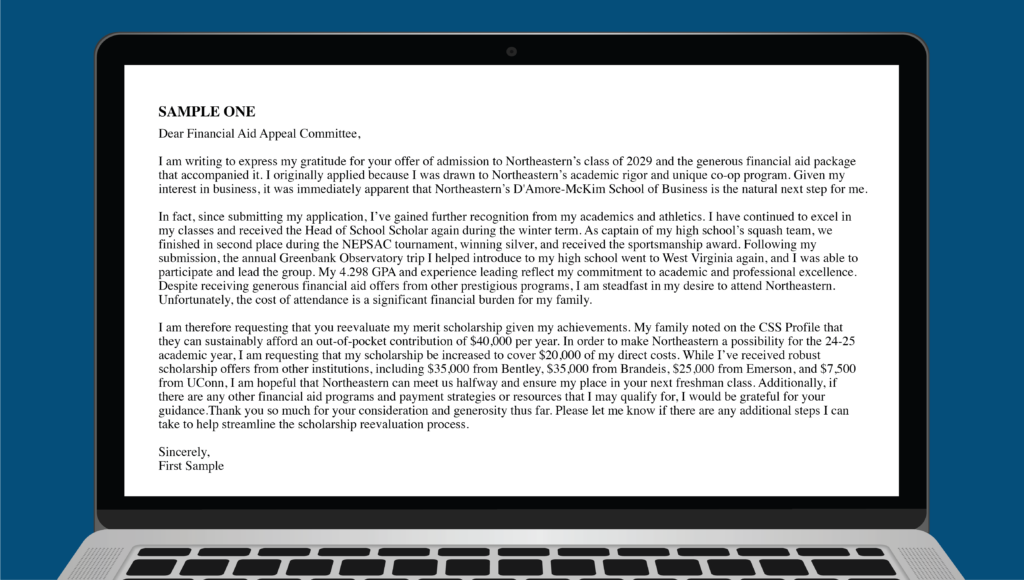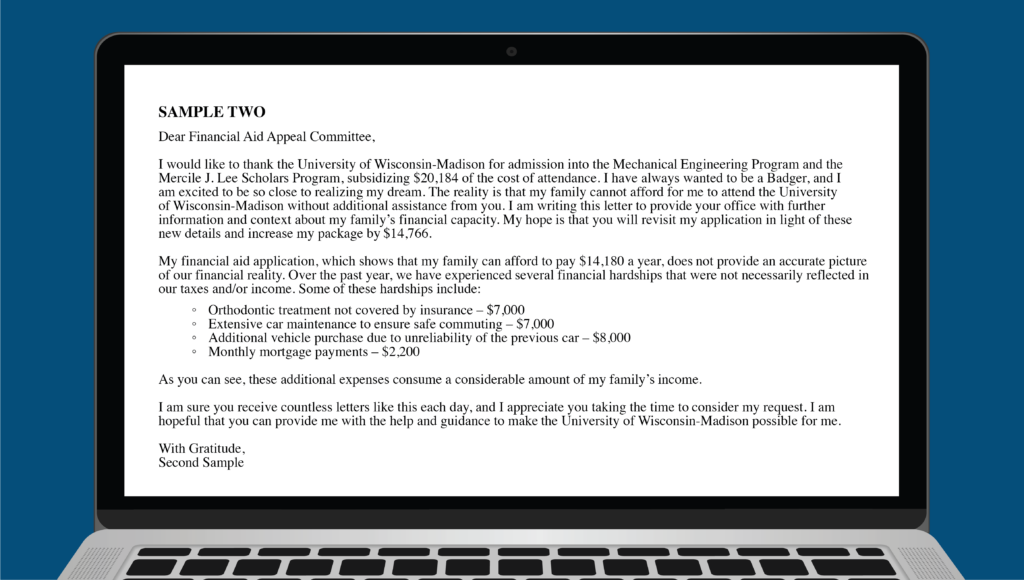
Financial Aid Appeal Letter
Getting into college is an incredible achievement — however, as tuition prices rise, figuring out how to pay is an enormous stressor for many. Many people qualify for financial aid money from the government or from their schools that helps them pay for college. If your aid package falls short of what you need, don’t panic! In this guide, we’ll teach you how to write a financial aid appeal letter to help make the cost of college affordable.
It’s important to note that not every student will be able to win more aid with a financial aid appeal letter. Financial aid appeal letters can help if your family’s financial circumstances have changed, but they’re less influential without a convincing appeal.
In the following article, we’ll go over:
- How to interpret your financial aid package
- What a financial aid appeal letter is and why you may need one
- Financial aid request letter samples to help you learn how to make yours effective
- Financial aid appeal letter template
- What to expect after you send in your financial aid appeal form
- Alternate methods for paying for college if your financial aid appeal letter isn’t successful
Keep reading to become an expert on financial aid appeal letters.
Congratulations on your College Acceptance!

First off, congratulations on getting into college! After the late nights finishing applications, writing essays, and worrying about decisions, you’ve made it. It’s a huge accomplishment, and definitely worth celebrating.
As the initial excitement fades, sometimes the reality of the situation sets in. You might get your financial aid award letter, and the number on it isn’t as high as you had hoped. Maybe you didn’t win any merit-based scholarships, or maybe your estimate for need-based aid has changed.
Before you commit to any school, it’s essential to understand what type of aid you’re being offered and to compare packages between schools. Remember that you might not have to pay the school’s full tuition. It’s also not unheard of that the school offering the most aid may not be the most affordable option overall.
Take the time to evaluate and compare the options of your financial aid award letters. Some students even speak to a financial aid advisor. The college and financial aid package you choose can make a huge difference down the line. Your decision may potentially put you in — or keep you clear of — thousands of dollars of debt.
And if the numbers you see on your financial aid award letter don’t work for your family? That’s where learning how to write a great financial aid appeal letter comes in. Later on, we’ll look at financial aid request letter samples and breakdowns of their strengths to help you learn how to write one.
Understanding your Financial Aid Package
Before we get into how to write a financial aid appeal letter, let’s review what’s in your financial aid package. The financial aid package shows you what you’ve been offered and how it fits into the overall cost of attendance.
First, let’s outline some terms you’ll need to know for writing your financial aid appeal letter and interpreting your package.
The cost of attendance is the total estimated cost of attending school for one year. This all-inclusive term includes tuition, fees, room and board, books, supplies, transportation and personal expenses. You can compare this number to the expected family contribution: the amount your family is expected to contribute to the cost of college. This figure is calculated through the FAFSA form (starting in the 2025–26 academic year, this will be called the Student Aid Index).
Your financial need is the difference between the cost of attendance and your expected family contribution. The net price is what you’ll pay after grants and scholarships are subtracted from your cost of attendance.
There are several types of aid you may receive. Merit-based scholarships and grants, like Pell Grants or institutional grants from your university, are free money you don’t need to repay. There are also work-study programs, which entail working on campus and putting your earnings toward payments. Finally, there are federal and private loans, which do need to be repaid.
When reviewing your package, pay attention to how much of your aid requires repayment. Loans charge interest when you repay them, ultimately costing you more overall.
Are financial aid offers final?

Before you write your financial aid appeal letter, you’re probably wondering, “Are these decisions final?”
Here’s a secret that colleges don’t always advertise: these packages can be negotiable! Financial aid packages are often proposals based on the information in your FAFSA, CSS profile, or other financial aid applications. They’re a starting point for discussion, not a final verdict. This is especially true if your circumstances have changed, or if some aspects of your financial situation weren’t captured initially.
Colleges typically set aside a portion of their financial aid budget specifically for appeals. They know some students need adjustments due to changes in family financial circumstances, or even competing offers from other institutions.
Your appeal outlook also depends on the school. Private institutions often have bigger endowments and more discretionary funds, so financial aid appeal letters may be more likely to succeed. Also, if you’re a very competitive applicant, you may be able to leverage that to win more money.
What is a Financial Aid Appeal?
So what exactly is a financial aid appeal letter, and why might you write one?
A financial aid appeal is a formal request to a financial aid office to review, and potentially adjust, your financial aid package. Financial aid appeal letters essentially make a case for why you need more money in order to attend their institution. In our financial aid request letter samples below, you’ll learn more about what this looks like in practice.
Think of the financial aid appeal letter as an opportunity to provide additional context or nuance that the FAFSA missed. The FAFSA can’t capture every financial circumstance, and the appeal lets you fill those gaps.
You might want to write a financial aid appeal letter if:
- A parent has lost their job.
- Your parents have divorced, or a parent has died.
- You’ve had to deal with extraordinary and unexpected expenses, like medical bills or natural disaster recovery costs.
- You’ve had a competitive offer from another college and you want to see if this one will match it.
- You just need more aid
The key to a successful financial aid appeal letter is documentation and specific details. Financial aid offices need objective evidence to justify increasing your aid package, not just a statement that college is expensive. Trust us, they already know.
You’ll see what makes a successful appeal letter for financial aid in our financial aid request letter samples further down.
Who can write a Financial Aid Appeal?
In most cases, the person who should write your financial aid appeal letter is you, the student. Any student who has been accepted into college and received a financial aid package can submit an appeal. Make sure to ask a parent, teacher, or financial aid advisor for help if you need it.
Many students mistakenly believe they can only write a financial aid appeal letter if they’ve experienced a dramatic change in circumstances. While difficult situations might help with how to win a financial aid appeal, they’re not a prerequisite. You can write an appeal letter for financial aid regardless of your circumstances.
You can see the variation in student experiences in our financial aid request letter samples, included below. In the first financial aid request letter sample, the student hopes their academic success will help them get more merit-based scholarships. In the second financial aid request letter sample, the student is dealing with unexpected circumstances.
Some financial aid appeal letters may require signatures from both you and your parents. However, financial aid appeal letters are typically submitted using a financial aid appeal form in the application portal or by email.
When can I send a Financial Aid Appeal Letter?

Timing matters when it comes to financial aid appeal letters.
The best time to send your financial aid appeal letter is as soon as you can after receiving your award package. Send financial aid appeal letters no later than 2–3 weeks before the enrollment deadline, usually in March or early April.
At this time, financial aid offices still have most of their funds available. Sending the letter as soon as you can is not only smart, but courteous as well. A prompt financial aid appeal letter shows that you care about attending that specific school.
However, financial aid appeal letters aren’t restricted to the initial application period. If your circumstances change dramatically after matriculation, you can send an appeal letter for financial aid during the school year. You can also send a letter after submitting updated financial aid applications for the next year of school. Since you have to reapply for financial aid, you can try to send a financial aid appeal letter multiple times.
How often do financial aid appeals get approved?
If you’re wondering about your chances with a financial aid appeal letter, the truth is that approval rates vary widely. Colleges don’t typically publish statistics on approvals for financial aid appeal letters. However, letters are said to have a reasonable success rate if the situation is compelling.
There are some factors that increase your chance of getting your financial aid appeal letter approved. Of course, severe hardship is more likely to receive consideration than just trying to match a better offer elsewhere. Additionally, the more well-documented your need, the better your chances are. Between two people with the same circumstances, the person with more thorough documents has a stronger financial aid appeal letter.
Unfortunately, there are also some factors regarding your financial aid appeal letter that you can’t control. Submitting your letter earlier makes it likely the school still has available funds, but it’s never guaranteed. Private institutions may be more likely to approve appeals, as they generally have more flexibility with their funds.
While there are no guarantees, many students do receive additional aid through submitting a financial aid appeal letter.
How to win a financial aid appeal
Now that you’ve learned about the financial aid process, you may be wondering how to win a financial aid appeal.
To learn how to win a financial aid appeal, start with a strong foundation for your financial aid appeal letter. Create a strong, evidence-based case for why you need and deserve additional aid.
Here’s how to approach the process of writing a killer financial aid appeal letter strategically. First, do some research. What’s the specific appeal process for your college? Can you find a place to submit a financial aid appeal letter or a financial aid request letter sample? If not, contact the financial aid office directly and ask.
Make sure you gather strong documentation for your financial aid appeal letter. This could include termination or layoff notices, medical bills or insurance documents, tax forms, or letters from social workers or therapists.
When thinking about how to win a financial aid appeal, remember that your letter should be polite, professional, and to the point. Your financial aid appeal letter is not an emotional plea, but a formal request to add more context to your case. Learn more below with our financial aid request letter samples.
What should I write in my Financial Aid Appeal Letter?

Your financial aid appeal letter should be clear, concise, and focused on objective factors rather than emotional pleas. While it’s fine to mention how much you want to attend that college, don’t lose focus. Your letter should focus on what’s happened in your life financially that makes it crucial that you get additional aid.
Talking about your financial situation in detail can be uncomfortable, but a financial aid appeal letter is not the place to hold back. Mention specific dollar amounts for how much you need vs. what you have been offered. Outline the costs of any unexpected events that have affected your ability to pay. These may include a car breaking down, wages from a lost job, medical bills, and so on.
What about things that you don’t want to include in your financial aid appeal letter? Leave out irrelevant personal details and vague statements like “college is expensive” or “education is important.” And forget about threats that you might pick another school — that’s not how to win a financial aid appeal. However, saying that you’ve received better packages elsewhere is acceptable, since that would have an actual effect on your ability to attend. In our financial aid request letter samples, you’ll see how one student navigates that challenge.
Good Excuses for Financial Aid Appeal
Some reasons in your financial aid appeal letter are more likely to result in additional funding than others. Generally, unexpected circumstances that had a big impact on your family’s financial situation are good candidates for your financial aid appeal form. You’ll see many of these situations in our financial aid request letter samples.
Let’s run through some examples. A parent losing a job or facing a significant pay cut is a strong basis for your financial aid appeal letter. Major medical expenses, or sudden parental disability or death are also compelling reasons. Another common reason is the need to support multiple family members in college, especially when the FAFSA didn’t accurately reflect multiple students. A natural disaster that requires the family to pay for repairs is not uncommon in financial aid appeal forms, either. Even your parents getting divorced can affect your household income — you can include that as well.
Aside from unexpected financial hardships, a good point in a financial aid appeal form is competitive financial aid offers. If Cornell gave you more money than Wesleyan, you can try to leverage that financial aid package in your appeal. This works best if the schools are of similar rank and prestige. Remember, you still must demonstrate that you need the higher aid amount in your appeal letter for financial aid.
How do you write an appeal letter?
Most colleges have specific protocols for financial aid appeal letters, and many will provide a financial aid appeal form. You can access the financial aid appeal form through the financial aid portal. If not, you can usually submit a financial aid appeal form or financial aid appeal letter through email or post. Always check your specific college’s requirements before sending anything.
Financial aid appeal forms usually ask for an explanation of your circumstances and your reason for appealing. That statement will be your financial aid appeal letter. It may also have a section or option to submit supporting documentation.
For your letter, you should use a clear, formal letter structure. Include a header, greeting, and a brief introduction. In the body of the financial aid appeal letter, provide the details of what happened and what you’re seeking. Finally, in the conclusion, detail exactly what you are hoping to gain with your financial aid appeal form.
Remember, focus on the facts and the problem at hand. If your parent lost their job, say that outright, and explain how much it is costing you. You can mention something that has caused you undue stress and made you unable to focus on work or school. With that in mind, don’t go into unnecessary detail about your life or feelings in your financial aid appeal form. Be clear at every point about how each factor affects your financial situation.
Financial Aid Appeal Letter Template
For how to win a financial aid appeal, you’ll want to have a well-structured, reasonably formal letter. Here’s a template for how to structure it:
Template for your Financial Aid Appeal Letter

Header/greeting
Include your contact information at the top of the financial aid appeal letter as if it’s any other letter. Then write the date and a professional greeting addressed to the financial aid committee. If you know or have communicated with a specific financial aid officer, you can write their name instead.
Introduction
State that you’re requesting a review of your financial aid package and express gratitude for the aid you’ve already been offered. Provide a brief summary of why you’re writing the financial aid appeal form.
Body
In the body of the financial aid appeal form or financial aid appeal letter, go into detail about your specific circumstances. Provide clear dollar amounts when and if it’s relevant, and explain how these circumstances impact your family’s ability to pay. Where possible, provide figures from your supporting documentation.
Conclusion
Request a specific outcome to close your financial aid appeal form or financial aid appeal letter. How much more money are you requesting to meet your need? Close with another “thank you” to the financial aid office for their consideration.
Sign the letter with “Sincerely,” “Warm regards,” or a similarly formal closing statement. The letter doesn’t have to be long — be concise when making your appeal.
Examples of Financial Aid Appeals
Here are two financial aid request letter samples. We’ll provide the full text of each letter with a brief analysis of why they’re effective.
Financial Aid Request Letter Sample #1

So what’s working in this financial aid request letter sample?
In this financial aid request letter sample, you’ll note that the student has not endured any additional financial hardship. This is not necessarily a bad thing. Remember: you do not have to have encountered unexpected financial circumstances in order to write an appeal letter for financial aid.
In Sample 1, the student’s tone is formal and polite. They begin the letter for financial aid expressing their gratitude for admission and the “generous” financial aid package they’ve received. The note about the specific program they’re in is a thoughtful touch. It shows that they are a dedicated and knowledgeable student, and that Northeastern should be invested in their attendance.
This is a good segue into the next section, where the student goes into detail on their continued academic achievements. They don’t just say that they are doing well academically. Rather, they reference specific recognitions: their success as captain of the squash team, their award for academic success, and high GPA.
In their conclusion, they say they’d like to attend Northeastern despite better financial aid offers they describe in detail. This is a tactful way to signal that the student has received better offers. Moreover, your appeal letter for financial aid hints that Northeastern must match those offers in order to get the student.
To see how to win a financial aid appeal, look no further than this financial aid request letter sample.
Financial Aid Request Letter Sample #2

The second financial aid request letter sample concerns unexpected financial circumstances that have put the cost of college out of reach. These are happenings that were unforeseen during the student’s college financial planning. As such, they could not have prepared for or mentioned these things on the initial FAFSA form.
The student is clear in this financial aid request letter sample that they cannot afford to attend without additional assistance. They also supply a specific number that they would need. They don’t posit a broad request for more money to cover the cost of college, but for $14,766 specifically. This specific amount implies careful consideration on the part of the student and makes it easier for the committee to evaluate.
The student elaborates on the expenses that have set their family back: medical expenses, car expenses, and mortgage payments. The mortgage payments detail may be less convincing — the family likely would have known about them when filing the FAFSA. However, if appropriate documentation is provided to explain, this is still useful.
6 Tips for Strengthening Your Financial Aid Appeal Letter
To master your college financial planning, here are 6 tips for strengthening your appeal letter for financial aid.
6 Tips to Writing your Best Financial Aid Appeal Letter

1. Be specific and factual.
General statements about financial hardship or the cost of college are not compelling enough for an appeal letter for financial aid. Instead of saying, “My family is going through financial difficulties,” use statistics and details to back up your claims. Try, “My father’s hours were reduced by 40% as of January 15, 2025, resulting in a monthly income decrease from $5,200 to $3,120.” Numbers and specific details give financial aid advisors information they can use to justify adjusting your financial aid award letter.
2. Provide strong documentation.
Every claim in your appeal letter for financial aid should be backed by official documentation. This might include:
- Pay stubs that show income changes
- Termination/layoff notices
- Medical bills or insurance statements
- Death certificates or obituaries
- Competing financial aid award letters
- Tax returns
The stronger the documentation for your appeal letter for financial aid, the more credible your appeal to cover the cost of college. Label each document clearly and reference them in your letter.
3. Maintain professionalism.
When thinking about how to win a financial aid appeal, how you communicate is almost as important as what you communicate. You can see this in both of the financial aid request letter samples. In both samples, the student uses the proper business letter format and addresses the financial aid advisor or committee respectfully. They avoid emotional manipulation or overly dramatic language and express gratitude for the aid they’ve already been awarded. Remember that financial aid officers and financial aid advisors are just people trying to help. Talk to them as allies, not adversaries. And proofread your letter for grammar and technical errors.
4. Ask for what you need.
When thinking about how to win a financial aid appeal, be clear about what you need. How much money exactly do you need in order to attend this school? If you’re trying to match a competing offer, how much more money is that? If you’re not sure, don’t worry — try consulting a financial aid advisor for guidance. If you’re unable to determine an amount, it’s also acceptable to request reconsideration based on the new information you’ve provided.
5. Highlight your commitment to education.
The schools you apply to are trying to assemble a unique, diverse, passionate class of people who will enrich the campus. Remind them why you’re the right person for that task. Mention your academic achievements, state specifics about the school that you’re excited about, say that this school is your top choice. Whatever you do, communicate how this additional aid will impact your educational goals. Remind them that their investment in you will pay off.
6. Follow all procedures and deadlines.
The most important step in how to win a financial aid appeal is submitting on time. When using an appeal letter for financial aid, follow all procedures and deadlines. Write and submit your letter as soon as possible after receiving your financial aid award letter. If the school requests that you email it, email it. If they provide a financial aid appeal form, fill that out. This shows respect for the process and ensures that your appeal doesn’t get delayed or overlooked due to technicalities.
Perhaps the most important tip for how to win a financial aid appeal? Just write an appeal letter for financial aid if you think you need to. You will never be penalized for an appeal letter for financial aid or faulted for perceived mistakes in your college financial planning. It’s always better to ask than not to ask at all!
What to expect after you appeal your Financial Aid?
You’ve read financial aid request letter samples and feel confident that you know how to win a financial aid appeal. You are ready to write and submit your letter. Once you send that in — either via your school’s financial aid portal or email — here’s what will likely happen next.
First, be on the lookout for an initial acknowledgement from the school that they’ve received your appeal letter. They’ll likely provide you with an estimated timeline for review, and information about any additional documentation that they might need.
If they ask you for official documentation, send it to them right away. Always be prompt and polite when dealing with your financial aid officer. College financial planning can be stressful, but making this part go as smoothly as possible will help in the long run.
Alternatively, if you don’t receive any acknowledgement from the school that they’ve gotten your appeal, reach out. You can contact them after a week or so to confirm that they’ve gotten it.
The review process can take anywhere from a week to a month — it varies based on the school. As part of the review, the financial aid officer will look through your materials and make an assessment. Then, your submission may be passed to a larger financial aid committee, or the director, who’ll make the final decision. If you get contacted at any point during the process to clarify or add something to your letter, don’t worry! They’re just trying to make sure they have all the necessary information to make the decision.
Outcomes
There are a few possible outcomes once your application has been reviewed.
First, you could get more aid. Hooray! The school may offer you additional grants, merit-based scholarships, or even low-interest loans to help you attend the school. Schools that have more money and more flexibility with how to use it may offer additional grants. Every university and every admissions cycle is different, though, so don’t expect any particular composition of additional aid.
You may also get an alternative offer: the school might meet some of the need you’ve communicated, but not all. Or maybe they’ll work with you to help finance your education in a way other than merit-scholarships or grants. They could provide you more work-study opportunities, different loan options, or payment plans to spread out the cost of college. They may also recommend you for some external merit-based scholarships.
Unfortunately, they could also deny your appeal. In some cases, they may not give you a satisfying reason why. It might be a policy that they don’t offer aid except in extenuating circumstances. It could be that they just don’t have the funds, no matter how early you apply.
5 Alternative Ways to Finance Your College Education
If you don’t get the additional merit-based scholarships or grants that you’re looking for, don’t despair. There are other ways to go about college financial planning so that you can finance your education.
5 Alternatives to Receiving Additional Aid

1. External scholarships
There are many external scholarships that you can apply for. Thousands of private scholarships are available from community organizations, companies, foundations, and nonprofits. You can search using free scholarship search engines like Fastweb, Scholarships.com, and the College Board’s Scholarship Search. Look for scholarships related to your interests or to your identity. There are scholarships out there for women, LGBTQ+ people, people of color, immigrants or children of immigrants, and more. Ask your guidance counselor or a college advisor for leads on scholarships.
2. Community college transfer
Many students begin their college journey at community college as a way of college financial planning. You can transfer to a four-year institution after a year or two and dramatically reduce your overall education costs. Community college students often live at home, so you’re saving not just on tuition, but on housing as well. Some private colleges even have specific partnerships and programs to help students transfer from community colleges.
3. Gap year
You don’t have to go to college right out of high school. In fact, a gap year can strengthen your application and make you a more interesting person on the other end. You can work full-time to save money or participate in service programs like AmeriCorps that provide education assistance. At the end, you can apply to colleges with a stronger resume showing all the new experiences you had. This can put you in a better position to receive merit scholarships and get into schools that provide more need-based aid.
4. Employer tuition assistance
Did you know there are some companies that will help you pay for college? Major employers like Starbucks, Amazon, Target, and Walmart offer some tuition assistance to their employees. Some hospitals and healthcare companies also have education benefits for their employees. Generally, as you have to be an employee to take advantage of tuition assistance, you will have to work. On the bright side, then you’ve got work experience and education wrapped up into one.
5. Part-time enrollment
Though you won’t finish your degree as fast, part-time enrollment is a great way to save money. You can take fewer credits each semester and fill the rest of your time with a part-time job. You can also take summer courses, which sometimes are discounted at public universities. This is a more challenging option, which you’ll have to plan carefully with your academic advisor. You must make sure that you stay eligible for the aid that you have been awarded.
Financial Aid Appeal Letter – Final Thoughts
Navigating the financial aid process — especially appeals — can feel overwhelming, but remember that you’re not alone in this journey. Thousands of students successfully appeal their financial aid packages each year and secure additional funding to attend their dream schools.
6 Key Takeaways

1. Financial aid offers are often negotiable, especially if your circumstances have changed or if you have competitive offers from other institutions.
2. Documentation is crucial to a successful appeal, so gather concrete evidence that supports your case.
3. Timing matters. Submit your appeal as soon as possible after receiving your initial aid package.
4. Maintain a respectful, appreciative tone in all communications with the financial aid office. Professionalism goes a long way.
5. Be specific about your needs: clearly articulate what would make it possible for you to attend the school.
6. If your appeal isn’t successful, don’t give up! You can explore alternative strategies to finance your college application rather than giving up on your education goals.
If you get your financial aid package and worry that it won’t be enough to meet your need, don’t panic. CollegeAdvisor is here to help. We have tons of free guides like financial aid request letter samples and resources like webinars with experts. We also offer personalized one-on-one advising, essay coaching, and interview prep. Schedule a free consultation today!

This article was written by Rachel Kahn. Looking for more admissions support? Click here to schedule a free meeting with one of our Admissions Specialists. During your meeting, our team will discuss your profile and help you find targeted ways to increase your admissions odds at top schools. We’ll also answer any questions and discuss how CollegeAdvisor.com can support you in the college application process.
